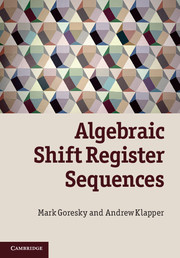Book contents
- Frontmatter
- Contents
- List of figures
- List of tables
- Acknowledgements
- 1 Introduction
- PART I ALGEBRAICALLY DEFINED SEQUENCES
- PART II PSEUDO-RANDOM AND PSEUDO-NOISE SEQUENCES
- PART III REGISTER SYNTHESIS AND SECURITY MEASURES
- 15 Register synthesis and LFSR synthesis
- 16 FCSR synthesis
- 17 AFSR synthesis
- 18 Average and asymptotic behavior of security measures
- PART IV ALGEBRAIC BACKGROUND
- Bibliography
- Index
16 - FCSR synthesis
from PART III - REGISTER SYNTHESIS AND SECURITY MEASURES
Published online by Cambridge University Press: 05 February 2012
- Frontmatter
- Contents
- List of figures
- List of tables
- Acknowledgements
- 1 Introduction
- PART I ALGEBRAICALLY DEFINED SEQUENCES
- PART II PSEUDO-RANDOM AND PSEUDO-NOISE SEQUENCES
- PART III REGISTER SYNTHESIS AND SECURITY MEASURES
- 15 Register synthesis and LFSR synthesis
- 16 FCSR synthesis
- 17 AFSR synthesis
- 18 Average and asymptotic behavior of security measures
- PART IV ALGEBRAIC BACKGROUND
- Bibliography
- Index
Summary
In this chapter we study the register synthesis problem for FCSRs. We describe two approaches to this problem, one based on the Euclidean algorithm and one based on the theory of approximation lattices. First we must make sense of the notion of the size of an FCSR.
N-adic span and complexity
As in the case of linear span, the N-adic span of a sequence is intended to measure how large an FCSR is required to output the sequence. In the LFSR case, this is given by the number of cells in an LFSR that outputs the sequence, and coincides with the degree of the connection polynomial, i.e., the denominator of the rational function giving the power series whose coefficients are the elements of the sequence.
In the N-ary FCSR case, things are more complicated. The number of N-ary coefficients in the connection integer equals the size of the basic register, but additional space is required for the memory. For purely periodic sequences, this extra memory is small (at most the logN of the number of cells in the basic register), and if such sequences were our only concern we could ignore the extra memory. However, an eventually periodic sequence may require a considerable amount of extra memory. We would like to define the N-adic span of an eventually periodic sequence a to be the number of cells in the register plus the number of elements needed for the memory of an FCSR which outputs the sequence a.
Information
- Type
- Chapter
- Information
- Algebraic Shift Register Sequences , pp. 322 - 346Publisher: Cambridge University PressPrint publication year: 2012
